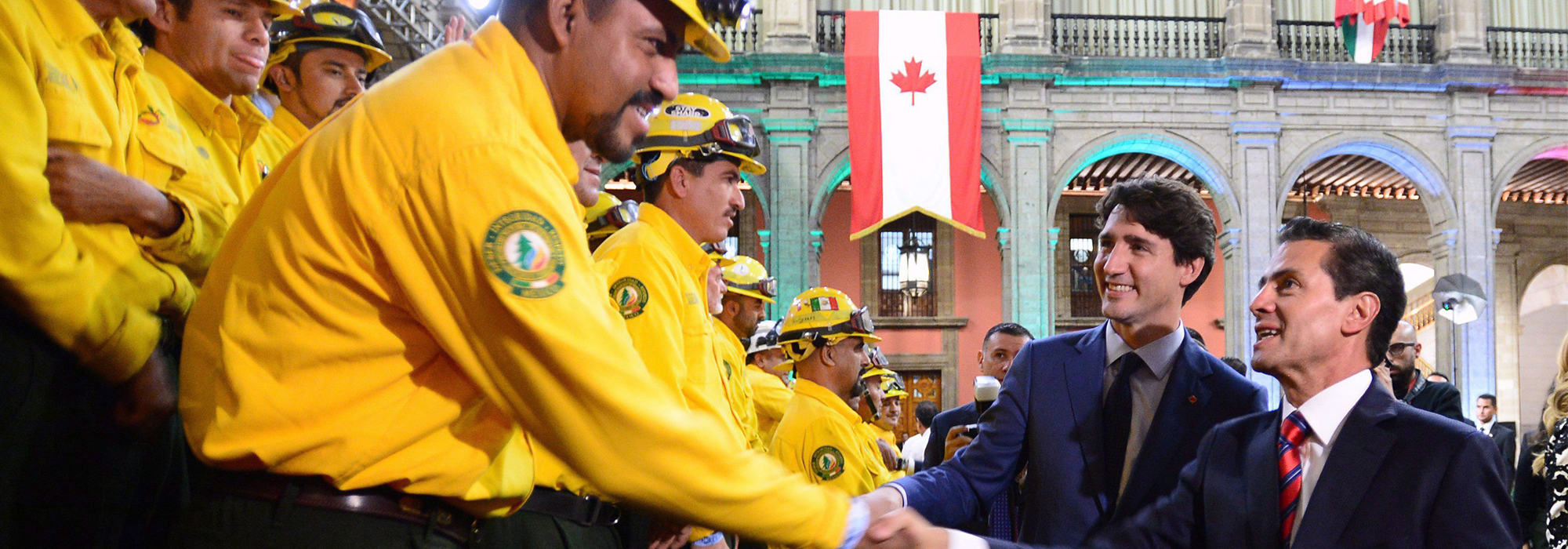
Before NAFTA, Canada and Mexico maintained relations that were friendly, albeit of little substance. Mexico’s request to negotiate a free trade agreement along the lines of the Canada-US Free Trade Agreement changed all that. Canada wanted to avoid the “hub and spoke” relationship that two bilateral relationships with the US would have produced, and went on to join the negotiations.
The trilateral economic relationship today is significantly bigger, but its true importance is the strategic nature it has acquired. Every cog in the elaborate North American supply chains depend on the other cogs to function smoothly. This has required active governmental participation from the three countries to fix all types of legal and border issues. Meanwhile, Mexico and Canada have developed a close political relationship – albeit one that is not devoid of conflict – largely because of the complex nature of the neighbour both nations share.
Canada and Mexico are very different in almost every regard: culture, history, traditions, society; they share obvious economic and trading interests, but it is the US that has forced the two nations to be actively engaged with one another.
At the G7 leaders’ summit in Charlevoix, Quebec, earlier this month, Prime Minister Justin Trudeau had the misfortune to suffer the slings of President Trump, something Mexicans can easily identify with. Might there be some commonalities in what has unfolded? President Donald Trump’s criteria for evaluating trade pacts hinge on trade deficits and American investment flowing into third countries. Canada, Mexico (and China) thus became prime targets, as they have pursued closer trade and investment ties through free trade.
Mexicans have been at the receiving end Trump’s ire and tactics since the primary season for the presidency began in the US. He has abused them over and over, calling Mexicans “rapists,” as just one example. While the Mexican government held tight in order to not poke the bear, many Mexicans kept on calling for a strong response. During the electoral period, the polls showed that each time a Mexican official of symbolic nature (notably former president Vicente Fox) responded to the insults, Trump’s numbers improved at home.
Then, all of a sudden, President Enrique Peña Nieto changed tactics and invited then-candidate Trump to visit Mexico. The visit was a disaster: Trump was given statesmanlike treatment and, at a press conference, was able to insult his hosts further. Trump had simultaneous translation at his disposal, and Peña Nieto did not, which further undermined the latter’s profile while enhancing Trump’s. Relations suffered and the two leaders have not met since, save for minor encounters at a couple of multilateral fora.
Neither substance nor friendliness have helped Canada and Mexico deal with the Trump administration. The NAFTA negotiations have shown an ever-shifting American counterpart, who often tries to use Mexicans to counter Canadian positions, and vice versa. The fact of the matter is that the Trump administration has a few very clear and deeply held positions on issues of importance to Canada and Mexico, and those positions, regardless of whether they are realistic or truthful, have made it very difficult to advance on substantive matters.
The Canada-US and Mexico-US borders are very different, because of the countries’ different levels of development. The trading disputes of the nations are very different. Canada has had far more than Mexico, many of them decades old. While Mexico has profound security issues that require permanent interaction with the US, Canada has lumber.
Much more significant is why the nations approached the US to pursue free trade in the first place. A few months ago, I was at a panel with Jeff Simpson, and he said that NAFTA for Canada is about trade and investment and absolutely nothing else. Well, for Mexicans, NAFTA is obviously about trade and investment, but it is also about politics. NAFTA helped to create strong institutions inside Mexico, supported by the US government. These institutions conferred certainty to investors that there would not be capricious changes in economic policy or the rules of the game.
Mexicans are facing, once more, the clash of two paradigms: on the one hand, an inward-looking nation that is distant from the world, and particularly from the US, or a reforming nation that accepts the complex nature of today’s world and is willing to tackle its difficulties head on.
For Mexico, losing NAFTA would lead to a dramatic change in its domestic politics in the July 1 presidential election. Without NAFTA, the new regime, likely a leftist Morena party government, would be free to turn Mexico inwards and backwards in its attempt to recreate the 1960s. In other words, Mexicans are facing, once more, the clash of two paradigms: on the one hand, an inward-looking nation that is distant from the world, and particularly from the US, or a reforming nation that accepts the complex nature of today’s world and is willing to tackle its difficulties head on.
Every now and then, these different political contexts between Canada and Mexico have led Ottawa to consider going it alone with the US, only to quickly realize that it is the trilateral nature of NAFTA that gives both Canada and Mexico a true fighting chance. If more evidence of this were required, in a classic divide-and-conquer manoeuvre, Trump recently called for two bilateral trading agreements between the US and Canada and the US and Mexico.
Canada and Mexico might be too weak separately to withstand America when it charges head on. But by virtue of their different situations, the two countries have protected each other’s interests. An extreme action taken against Mexico might be seen as wholly inappropriate when applied in the US-Canada context, and vice-versa. By definition, a trilateral pact evens out and moderates power, while a bilateral trade deal would confer immense powers to the already powerful shared neighbour.
Above all, should NAFTA disappear, the existing integrated supply chains would lose vitality, something that two separate trade agreements would not protect either. Trump’s proposal to have two bilateral deals is largely an act of desperation, precisely to separate its two neighbours and impose itself on each one.
Canadians and Mexicans will have to deal with the Trump administration regardless of their preferences and, to be successful in this quest, they need to recognize that Trump is more the symptom than the cause of the change in Americans’ attitudes toward their neighbours (and, in fact, toward the world). They will need to engage with ordinary Americans to drive home the fact that the three countries have shared interests, and above all to underscore the contribution that Canada and Mexico make to the wellbeing of US citizens.
Although the issues that concern Americans about Canada are different from those about Mexico, a common strategy would not only strengthen both Canada’s and Mexico’s interests, but it would also be more compelling to Americans. All three countries would be much better off if they relearned how to work together.
Photo: Prime Minister Justin Trudeau and Mexican President Enrique Pena Nieto, right, at the Palacio Nacional in Mexico City on October 12, 2017, shake hands with Mexican firefighters who helped to fight Canadian forest fires. The Canadian Press, by Sean Kilpatrick.
Do you have something to say about the article you just read? Be part of the Policy Options discussion, and send in your own submission. Here is a link on how to do it. | Souhaitez-vous réagir à cet article ? Joignez-vous aux débats d’Options politiques et soumettez-nous votre texte en suivant ces directives.








